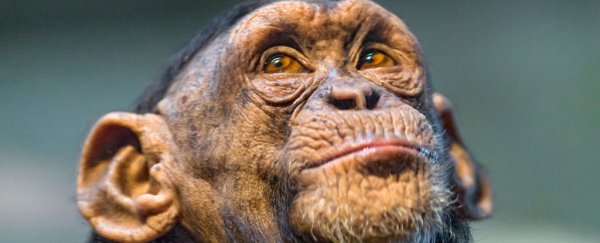In an open letter on the National Institutes of Health (NIH) website, the head of the US health body has announced that the organisation will no longer support biomedical research on chimpanzees.
The move follows the NIH's decision in June 2013 to significantly reduce the use of chimpanzees in the biomedical research it supports. That determination resulted in the agency sending about 300 chimps into retirement, although it retained 50 of the animals in case of further research needs. As of today, those last remaining animals will no longer be subjected to experimental testing.
"[I]t is clear that we've reached a tipping point," writes Francis S. Collins, director of the NIH. "In accordance with NIH's commitment in June 2013, I have reassessed the need to maintain chimpanzees for biomedical research and decided that effective immediately, NIH will no longer maintain a colony of 50 chimpanzees for future research."
The remaining chimps will be relocated to a sanctuary, Chimp Haven in Louisiana, as space becomes available, with considerations being made for their welfare in terms of health and social grouping. The facility already houses 200 of the animals.
"Now, we really see the agency closing and locking the door behind the chimps and throwing away the key on their way out of the laboratories," said Wayne Pacelle, president and CEO of the Humane Society, in reaction to the announcement. "It's rare to close out a category of animal use so emphatically. That's exactly what's happening here, and it's thrilling."
But while the move has been welcomed by animal activists, not everybody is pleased that the NIH has decided chimpanzees, even in such small numbers, are not relevant to future research interests – especially if unforeseen biological threats, such as a new kind of pathogen, were to emerge.
"Given NIH's primary mission to protect public health, it seems surprising," Frankie Trull, president of the Foundation for Biomedical Research, told Sara Reardon at Nature. "I don't understand the decision of 'we're going to take that resource away forever'."
But speaking of resources, it's also important to clarify that the NIH's announcement only pertains to chimpanzees – not to any other species of non-human primate, nor to any of the other estimated 25 million vertebrate animals used annually in research, testing, and education in the US.
"Research with non-human primates has and continues to be vital to helping us understand and improve human health in a multitude of ways, including the development of treatments and interventions," writes Collins. "These decisions are specific to chimpanzees. Research with other non-human primates will continue to be valued, supported, and conducted by the NIH."
